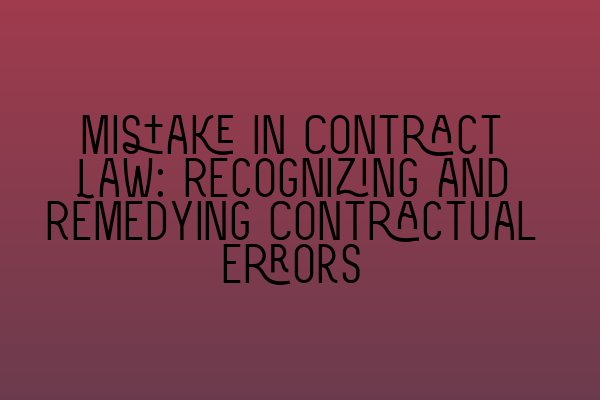Mistake in Contract Law: Recognizing and Remedying Contractual Errors
Contract law is an essential aspect of commercial transactions, as it provides a legal framework for parties to enter into agreements and enforce their rights and obligations. However, even with careful drafting and negotiations, mistakes can occur in contracts that may have significant implications for the parties involved. In this article, we will explore the concept of mistake in contract law, discuss the different types of contractual errors, and examine the remedies available to rectify such mistakes.
Understanding Mistake in Contract Law
Mistake, in the context of contract law, refers to an erroneous belief held by one or both parties at the time of contract formation. It occurs when the parties are mistaken about a fundamental aspect of the contract, which may affect its validity, enforceability, or performance. Mistakes can arise from various factors, including miscommunication, misinterpretation, or unforeseen circumstances.
There are two primary categories of mistakes in contract law:
- Unilateral Mistake: This type of mistake occurs when only one party is mistaken about a material term or fact of the contract. For instance, if Party A mistakenly enters into a contract believing that the subject matter is a rare painting when, in fact, it is a replica, a unilateral mistake arises. In such cases, the mistaken party may seek relief based on the doctrine of unilateral mistake.
- Mutual Mistake: Mutual mistake, on the other hand, occurs when both parties share the same mistaken belief about a material term or fact of the contract. For example, if both Party A and Party B enter into a contract believing that a particular item is in perfect condition, when it is actually damaged, a mutual mistake arises. The doctrine of mutual mistake allows the parties to rescind the contract and return to their pre-contractual positions.
Remedies for Contractual Mistakes
When a mistake is identified in a contract, the parties may seek various remedies to rectify the error and protect their rights. Some common remedies for contractual mistakes include:
- Rescission: Rescission allows the parties to set aside the contract and return to their pre-contractual positions. This remedy is typically available in cases of mutual mistake or where a unilateral mistake was induced by fraud, misrepresentation, or duress.
- Rectification: Rectification involves correcting the written terms of a contract to reflect the true intentions of the parties. This remedy is available when there is clear and convincing evidence that the written contract does not accurately represent the agreement reached by the parties.
- Reformation: Reformation is similar to rectification but involves modifying the terms of a contract, rather than simply correcting them. This remedy is often used when a mistake in the written contract results in an unfair or inequitable outcome.
- Damages: In certain cases, the party affected by the mistake may be entitled to claim damages to compensate for any losses suffered as a result of the error. Damages are typically available when the mistake has caused financial harm or loss of opportunity.
Conclusion
Mistakes in contract law can have significant ramifications for parties involved in a contractual agreement. Understanding the different types of mistakes and the available remedies is crucial in safeguarding one’s legal rights and interests. By recognizing and addressing contractual errors promptly, parties can protect their investments, maintain business relationships, and ensure fair and just outcomes.
For more information about contract law and exam preparations, we recommend checking out the following related articles:
